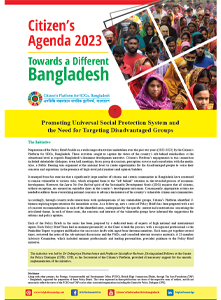 Background and Context
Background and Context
Bangladesh has made remarkable strides in terms of socio-economic advancement indicators, sustaining an average yearly GDP growth of close to 6 per cent since the early 1990s, accelerating the pace in recent times, and markedly reducing poverty incidence from nearly 60 per cent to about 18.7 per cent in 2022. However, significant challenges remain in tackling poverty and addressing the manifold vulnerabilities that inform the growth narrative. To recall, only 28 per cent of the country’s population is covered by at least one social safety net programme. In urban areas, social protection coverage is even lower, at only about 10 per cent according to the Household Income Expenditure Survey data of 2016. Additionally, the onslaught of the COVID-19 pandemic of the recent past has exposed major weaknesses in the prevailing social protection system in Bangladesh. Extensive job cuts triggered by the pandemic revealed significant shortcomings in the system as it failed to offer proper assistance to individuals who became suddenly jobless.
People belonging to the marginalised groups suffered the most in this backdrop. Whilst the pandemic is now behind, this time it is the rising inflation which is affecting the lives and livelihoods of particularly the low-income households and vulnerable groups. They are struggling to keep up with the increasing cost of daily commodities; many have to stand in long lines for government food support programmes. In addition to the above, Bangladesh remains prone to climate-induced challenges that have significant adverse implications for climate-stressed regions, with the difficulties no doubt being more pronounced for marginalised groups.
In the above backdrop, more specifically in view of the Sustainable Development Goals (SDGs), which has the “Leave No One Behind” (LNOB) spirit at the centre of focus, the case for establishing a Universal Social Protection system (USP) in Bangladesh has emerged as a key deliverable that demands urgent attention and action on the part of policymakers. Indeed, Bangladesh’s commitment to social protection is enshrined in the country’s constitution. Article 15 of the constitution stipulates that securing the right to social protection is a fundamental state responsibility.
As Bangladesh aims to become a developed country by 2041, establishing a USP system ought to be seen as a key component of its development agendas. To note, in developed countries such as Finland, Canada, Japan, and the UK, more than 90 per cent of the population is covered under social protection support system.
The introduction of the USP system will allow Bangladesh to strengthen social protection across four broad aspects: universal coverage, comprehensive protection in terms of risks covered, adequacy of protection across the life cycle, and sustainability of the social protection system.
While Bangladesh has a long history of providing social protection support through dedicated schemes, the adoption of the National Social Security Strategy (NSSS) in 2015 ought to be seen as an important milestone in re-energising the country’s social protection system. The NSSS lays out several reform priorities towards a USP system in Bangladesh. It is important to note that the concept of “universal” social protection goes hand in hand with the aspiration of building an inclusive society in Bangladesh, which is at the centre of the NSSS.
Having a clear understanding about the core elements of USP, in line with the NSSS, is a necessary first step to ensure that no one is left behind. The core ideas informing USP, in line with the concept of a welfare state, need to be appropriately understood.
Published: May 2024


Leave A Comment